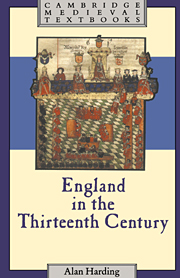Book contents
- Frontmatter
- Contents
- Preface and acknowledgements
- List of abbreviations
- Chronological table
- 1 Introduction: sources and interpretations
- 2 The peasants and the land
- 3 Traders and townsmen
- 4 Professional people
- 5 Knights
- 6 Magnates
- 7 Thirteenth-century politics
- Conclusion: the making of a state
- Guide to further reading
- Index
- Cambridge Medieval Textbooks
1 - Introduction: sources and interpretations
Published online by Cambridge University Press: 05 June 2012
- Frontmatter
- Contents
- Preface and acknowledgements
- List of abbreviations
- Chronological table
- 1 Introduction: sources and interpretations
- 2 The peasants and the land
- 3 Traders and townsmen
- 4 Professional people
- 5 Knights
- 6 Magnates
- 7 Thirteenth-century politics
- Conclusion: the making of a state
- Guide to further reading
- Index
- Cambridge Medieval Textbooks
Summary
The interpretation of the past is a dialogue between the available evidence and historians who write from their own situation and understanding of society. This is equally true of the contemporary chroniclers and of historians working six hundred and more years after the period they study. The real subject of this first chapter is the changing ways in which thirteenth-century England was important to later generations.
THE CONTEMPORARY CHRONICLERS
The foundations of our image of thirteenth-century England were laid by forty or so contemporaries: some of them the anonymous authors of sets of annals, who continued year by year lists of outstanding events which they took over from previous annalists; at the other extreme, Matthew Paris, a major figure both as chronicler and artist, about whose personality and prejudices we know more than for almost anyone of the period. Thirteenth-century chroniclers of course continued to be churchmen, with the exception of a few London merchants who began to take an interest in compiling the annals of their city. As clerics they were peculiar in almost all being ‘religious’, however, that is monks or friars living by particular sets of rules as members of sometimes very rich communities – a marked change from the situation in the later twelfth century, when the ‘secular’ clergy who staffed the fast-growing royal administration had produced notable historians such as Richard FitzNeal and Roger of Howden.
- Type
- Chapter
- Information
- England in the Thirteenth Century , pp. 1 - 67Publisher: Cambridge University PressPrint publication year: 1993

